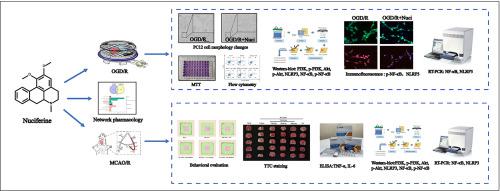Phytomedicine ( IF 6.7 ) Pub Date : 2023-12-24 , DOI: 10.1016/j.phymed.2023.155312 Jinhua Li 1 , Shuze Dong 1 , Shengli Quan 1 , Shuxian Ding 1 , Xuebin Zhou 1 , Ye Yu 1 , Yarong Wu 1 , Wenhai Huang 1 , Qiyuan Shi 1 , Qin Li 1

|
Background
Cerebral ischemia has the characteristics of high incidence, mortality, and disability, which seriously damages people's health. Cerebral ischemia-reperfusion injury is the key pathological injury of this disease. However, there is a lack of drugs that can reduce cerebral ischemia-reperfusion injury in clinical practice. At present, a few studies have provided some evidence that nuciferine can reduce cerebral ischemia-reperfusion injury, but its specific mechanism of action is still unclear, and further research is still needed.
Objective
In this study, PC12 cells and SD rats were used to construct OGD/R and MCAO/R models, respectively. Combined with bioinformatics methods and experimental verification methods, the purpose of this study was to conduct a systematic and comprehensive study on the effect and mechanism of nuciferine on reducing inflammation induced by cerebral ischemia-reperfusion injury.
Results
Nuciferine can improve the cell viability of PC12 cells induced by OGD/R, reduce apoptosis, and reduce the expression of inflammation-related proteins; it can also improve the cognitive and motor dysfunction of MCAO/R-induced rats by behavioral tests, reduce the area of cerebral infarction, reduce the release of inflammatory factors TNF-α and IL-6 in serum and the expression of inflammation-related proteins in brain tissue.
Conclusion
Nuciferine can reduce the inflammatory level of cerebral ischemia-reperfusion injury in vivo and in vitro models by acting on the PI3K/Akt/NF-κB signaling pathway, and has the potential to be developed as a drug for the treatment of cerebral ischemia-reperfusion injury.
中文翻译:

荷叶碱通过 PI3K/Akt/NF-κB 通路减轻脑缺血再灌注损伤引起的炎症
背景
脑缺血具有发病率高、死亡率高、致残率高的特点,严重损害人们的健康。脑缺血再灌注损伤是本病的关键病理损伤。但临床上缺乏减轻脑缺血再灌注损伤的药物。目前,少数研究提供了荷叶碱可减轻脑缺血再灌注损伤的部分证据,但其具体作用机制尚不清楚,仍需进一步研究。
客观的
本研究分别采用PC12细胞和SD大鼠构建OGD/R和MCAO/R模型。本研究旨在结合生物信息学方法和实验验证方法,对荷叶碱减轻脑缺血再灌注损伤所致炎症的作用及机制进行系统、全面的研究。
结果
荷叶碱可以提高OGD/R诱导的PC12细胞的细胞活力,减少细胞凋亡,减少炎症相关蛋白的表达;通过行为学测试还可以改善MCAO/R诱导的大鼠的认知和运动功能障碍,减少脑梗塞面积,减少血清中炎症因子TNF-α和IL-6的释放以及炎症相关蛋白的表达在脑组织中。
结论
荷叶碱可通过作用于PI3K/Akt/NF-κB信号通路降低体内外脑缺血再灌注损伤模型的炎症水平,具有开发为脑缺血再灌注治疗药物的潜力受伤。































 京公网安备 11010802027423号
京公网安备 11010802027423号